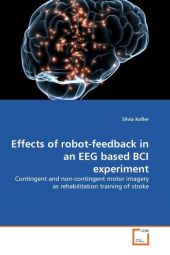 Neuerscheinungen 2010Stand: 2020-01-07 |
Schnellsuche
ISBN/Stichwort/Autor
|
Herderstraße 10
10625 Berlin
Tel.: 030 315 714 16
Fax 030 315 714 14
info@buchspektrum.de |

Silvia Kofler
Effects of robot-feedback in an EEG based BCI experiment
Contingent and non-contingent motor imagery as rehabilitation training of stroke
2010. 112 S. 220 mm
Verlag/Jahr: VDM VERLAG DR. MÜLLER 2010
ISBN: 3-639-30228-1 (3639302281)
Neue ISBN: 978-3-639-30228-8 (9783639302288)
Preis und Lieferzeit: Bitte klicken
This thesis is based on the intention to implement a motor imagery based Brain Computer Interface training paradigm for motor rehabilitation on stroke patients. The study wanted to investigate whether or not the presentation of contingent motor feedback in a motor imagery based BCI training is necessary for learning to control and modulate the SMR band power compared to a motor imagery condition with mock feedback. Fourteen healthy subjects performed four randomly presented motor related tasks in four consecutive sessions of BCI training: active and passive movements with a hand orthosis, as well as motor imagery followed or not with motor feedback via the same orthosis. Two groups were created, one receiving contingent (CF), and the other one receiving fake motor feedback (FF) in the imagery condition with included feedback. The corresponding hypothesis assumed that the group receiving CF would have stronger SMR power modulation and a better BCI control of the hand orthosis than the group receiving FF.
Mag.rer.nat.Silvia Kofler, born 1984 in Salzburg, studied Psychology and Molecular Biology in Graz and specialized in cognitive neuroscience. She was working in numerous research projects in Graz, Tübingen and Sweden, dealing with neural principles of creativity, emotion and neuro-rehabilitation of stroke via BCI trainings in motor imagery.


